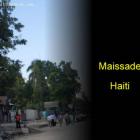ADVERTISEMENT
Energy Environment
The environment of Haiti is faced with huge problem. The total forest cover was approximately 2% in a country where 75% of energy demands were satisfied by wood fuel, and a lack of trees had in turn caused significant soil erosion.
Mosaic and Verizon Putting Poor Nations on the Solar Grid
Mosaic, a solar development company, is using a new business model to fund solar projects in emerging nations. To help launch Mosaic's new venture, Verizon Powerful Answers (VPA) awarded Mosaic one million dollars. Mosaic made this disclosure at the Las Vegas Consumer Electronics Show recently. VPA helps to fund education, healthcare, and sustainability programs, and is partnering with Mosaic to offer solar electricity to underdeveloped nations.
Mosaic stands to make huge profits with this endeavor. According to Mosaic co-founder and president, Billy Parish, ". . . a $15 billion market (is) emerging for micro- and mini-grids . . ." Using the new term, 'impact investing', Parish says trillions are being spent by investors, who see substantial returns on investment from this new market. He claims Mosaic possesses the experience and resources to offer this investment opportunity to U.S. investors. They will become part of the clean energy movement that will help people currently living off the grid.
Caracol Gets on Power Grid at Last
Caracol, Haiti, which had never been on the power grid, has been able to receive electricity service for the first time due to the Boone Electric Cooperative (BEC). The project has been ongoing for the last two years. The project really started to pick up steam when the Community Electrification Project (CEP) began their own efforts to bring electric service to rural areas in Haiti like Caracol.
Two electricians, Travis Lynn and Simon Munnik, from BEC and CEP respectively, merged their knowledge and experience to help complete the project in Caracol. Munnik discovered what a first-rate electrician service is all about when he went to see the BEC operation in Caracol. He observed the tools used and safety standards adhered to missing in Haiti's utility sector.
Peligre Dam in Centre Department
Located just off the Centre Department of the Artibonite River in Haiti is the Péligre Dam which is a hydroelectric dam. This dam is a feature of both Haiti and the Dominican Republic. It is the largest dam on the island of Hispaniola and was created in the 1930's as part of the valley Agriculture Project to control flooding and provide energy assistance in the Artibonite River Valley. In 1956 the dam was completed creating the Lake Péligre with the hydroelectric portion being completed in 1971. The plant is capable of providing the country with most of its electricity.
The Establishment of ECCO2 Haiti Civil Society Organization
The Haitian Ministry of Natural Resources, Agriculture, and Rural Development has publicized its endorsement and support to the Haitian Agency for Social, Educational and Environmental Development (AHDSEE). The AHDSEE is an NGO member of "ECCO2 Global Partners" which has program to arrange financial aid in Haiti for promoting development in education, trade, opportunities and environment. ECCO2 encourages every business owner and entrepreneur to participate in clean tech companies that have substantial growth opportunities. They have recently announced their programs on energy efficient clean-technology solutions with thousands of career opportunities in Haiti.
Initially in 2012, the Haitian Senate Commission of Foreign Affairs approved the MOU on climate change and environment study between ECCO2 and World Council of Diplomatic Congress of Chaplains for Universal Peace Human Legal and Rights (CMOCDAPUNDHJ), an international organization and partners to the United Nations. However, the project had a slow start. One year later, the MOU was further amended and approved by the Ministry of Planification and was finally signed by the Prime Minister Laurent Lamothe and AHDSEE.
Haiti Ranks Number One on Global Climate Risk Index
The Global Climate Risk Index (GCRI) rated Haiti as the number one country most affected by natural disasters in 2012. The Philippines and Pakistan followed at two and three. Haiti's worst devastation in 2012 was caused by Hurricane Sandy, which hit U.S. shores in the northernmost eastern seaboard states.
Research and advocacy organization, Germanwatch, reports emerging nations make up the majority of nations on the index. But more prosperous nations are inching up the index as well. The U.S., the wealthiest nation in the world, ranked 12th for extreme weather events in 2012. For Russia, who ranked ninth on the index, the rating seems not to have affected either their domestic or international climate policy. Russia's laxness in social policymaking extends to human rights also: it is against gay marriage.
Peligre Hydroelectric Plant Restoration
The Péligre Hydroelectric Plant, located in Central Department, supplies Haiti with much of the island's electricity needs. But in the past few decades it has deteriorated, neglected by Électricité d'Haiti, the national provider of energy.
Haitian President Martelly has made improving the energy infrastructure a primary focus of his 5 "E" initiative. Germany has responded to Martelly's call for a reliable energy system, by funding the restoration of the PHP. The goal is to provide Haiti with electricity service 24 hours a day in the not- too-distant future.
In an agreement with Germany, Minister of Economy and Finance, Wilson Laleau, along with German Ambassador, Klaus Shick, served as signatories to a memorandum of understanding for the sum of ten million Euros to restore the PHP. The PHP serves the Péligre Hydroelectric Dam (PHD), situated on the Artibonite River. It was constructed under the Artibonite Valley Agricultural Project during the 1930s, producing the Lake Péligre reservoir. Problems with the PHD have developed over past decades with large amounts of silt deposits increasing at an alarming rate. As a result, the reservoir's energy-producing capacity has declined. The cause of the alluvial buildup is deforestation of the island. Only 4%-6% of tree cover remains, when once the entire country was blanketed with forests.
World Vision Reforestation Project to bring back Farmlands
World Vision (WV), a global development organization, is on an exploratory mission in Haiti to tackle the reforestation problem. WV wants to find areas in Haiti that are most receptive to the Farmer Managed Natural Regeneration (FMNR) project, which has been successful in several African countries.
World Vision Business Manager of Climate Change, Food, and Security, Tim Morris, says the FMNR program uses surviving tree stumps and root systems to bring back deteriorated, unproductive land to farm- and forestlands. He believes Haiti has the right conditions to perform the regeneration, due to the state of the tree stumps, which have been felled to make charcoal.
World Bank Di Bagay yo pa Kle ak Lajan Luil Venezuela-sa!
Mezanmi, opozisyon an gin jett nan min yo. The special envoy to Haiti for the World Bank said he is concerned on how the Haitian government is using the money generated by Venezuelan petroleum. According to him, that is a lack of transparency.
Blan-an di: "Nou pa ka kite sourit Ap veye format"
Sanble ke World Bank pete yon abse!
Mary Barton-Dock who is the director of the World Bank's office in Haiti, said that lack of transparency was the biggest obstacle to Haiti's economic development.
Ginyin yon proveb ki di, lafimin pa jam soty san dife
Mining Impact Assessments for Haiti's Environment and People
Exploratory drilling in the mountainous regions of northern Haiti, near the Dominican Republic, has been occurring the last few years. Trace deposits of gold, silver, and copper have been mined, an estimated $200 billion's worth. It sounds like a boon for Haiti's fractured economy, but sobering realities are coming into play, concerning the adverse impact of mining on the environment and people's health. Oxfam America, a development organization, has alerted the government of Haiti (GOH) dangers of mining may outweigh economic benefits derived from its practice.
The Center for Science in Public Participation (CSPP) released a report detailing Haiti's potential to authorize and monitor mining activities, as well as comprehensiveness of its best practices, regarding its laws and regulatory framework. Because mining in Haiti is in its nascence, CSPP's report is asking the GOH to create a considered mineral development plan to balance the needs of mining projects with the equally important needs of the environment. CSPP has suggested a five-step process for a strategic development plan:
Electricite d'Haiti (EDH) to roll out New Payment Plan
Prime Minister Laurent Lamothe has okayed a new payment program for electricity usage in Haiti. It is a pay-as-you-go plan Electricite d' Haiti (EdH) will implement under the go-ahead from newly- installed EdH Director, Jean Morose.
As it stands now, most residents of Haiti do not pay for electricity. They cheat the system by getting on the power grid hooked up to local businesses. Businesses get reduced service as a result, and only make partial payments. With this new system, Electricite d'Haiti (EdH) customers will purchase a pre-paid card, inputting with what frequency they want to pay, and how much they want to pay before they receive electricity service.
Our objective is to share with you news and information about Haiti and the people of Haiti. Traditions, habits and the way we were or grew are alive in this site. We highly recommend that you Subscribe to our Newsletter and also share with us some of the things that are memorable and made us unique people.

 Life After Death
Life After Death  Haiti tech Summit
Haiti tech Summit  Something to think about
Something to think about  Saint Marc, Haiti
Saint Marc, Haiti  Maissade, Haiti
Maissade, Haiti